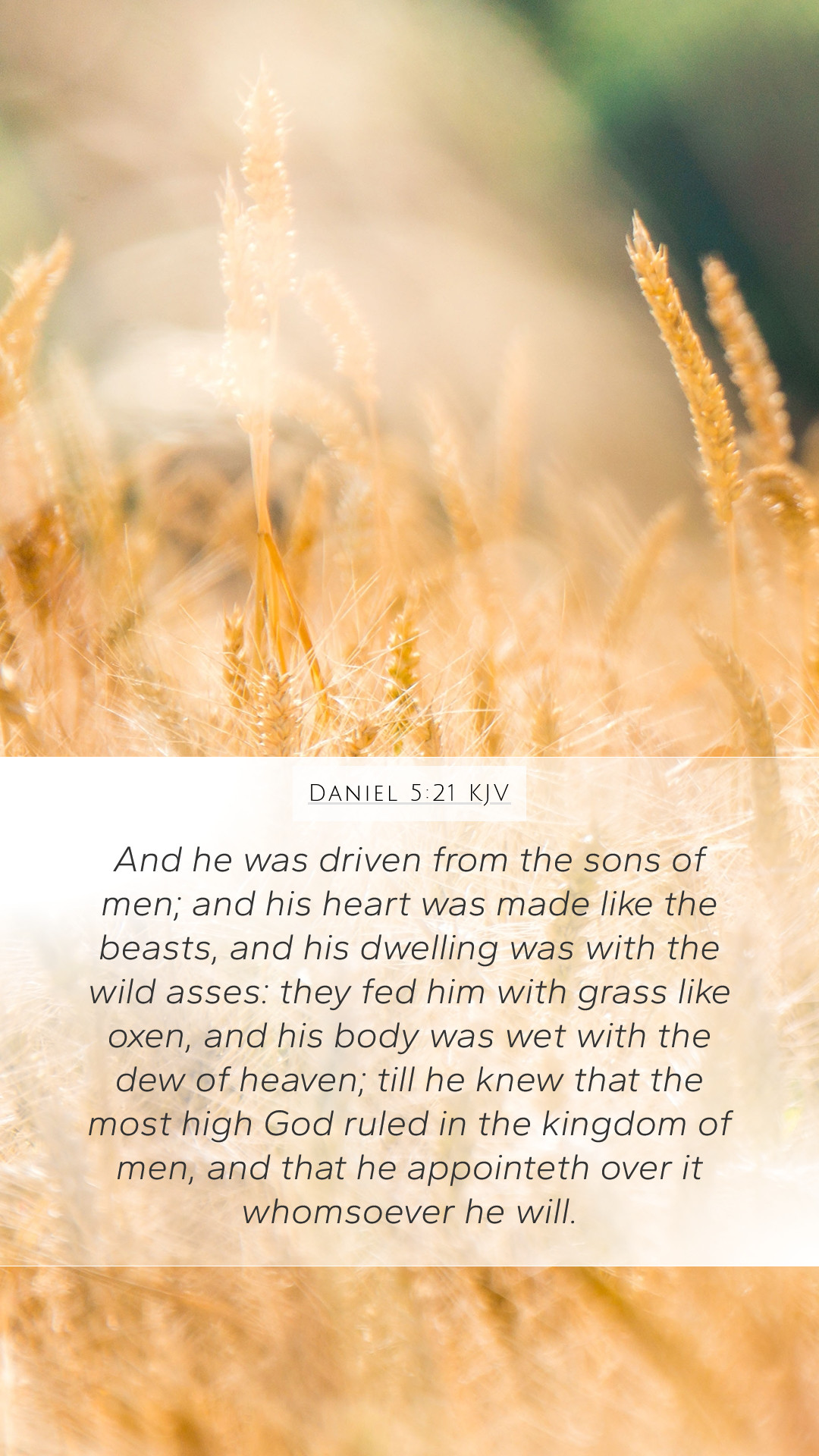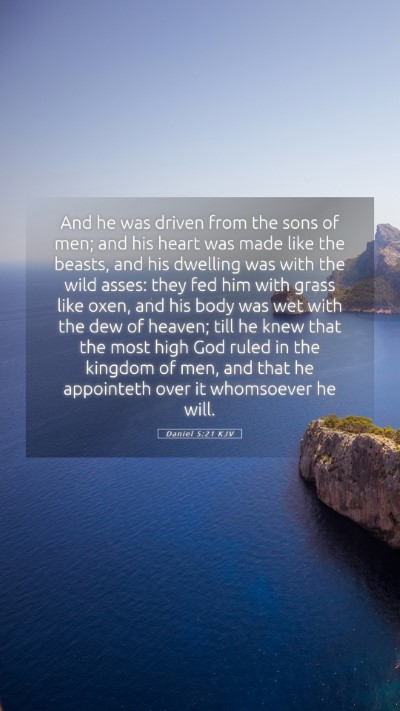Understanding Daniel 5:21
Verse: "And he was driven from the sons of men; and his heart was made like the beasts, and his dwelling was with the wild asses: they fed him with grass like oxen, and his body was wet with the dew of heaven; till he knew that the most High God ruled in the kingdom of men, and that he appointeth over it whomsoever he will." (Daniel 5:21)
Bible Verse Meaning
In Daniel 5:21, we find an account of Nebuchadnezzar's punishment as a consequence of his pride and failure to acknowledge God's sovereignty. The verse reveals a drastic transformation from a king to one who lives like an animal, illustrating the consequences of pride and the ultimate authority of God over human affairs.
This reflects the overarching theme of divine sovereignty in the Book of Daniel, showcasing how God is in total control over the kingdoms of men. The verse serves as a stark reminder of the importance of humility and recognition of God's power.
Commentary Insights
- Matthew Henry: Henry emphasizes the idea that Nebuchadnezzar’s punishment was a direct result of his arrogance. He suggests that God's judgment serves as a warning about the dangers of pride, highlighting that "the Most High God rules in the kingdom of men," effectively reminding readers that all authority ultimately comes from God.
- Albert Barnes: Barnes notes that the transformation of Nebuchadnezzar into a beast symbolizes the loss of reason and dignity when one strays from God’s path. He indicates that this humiliation was not only a personal judgment but also a public declaration of God’s supremacy over earthly rulers.
- Adam Clarke: Clarke discusses the psychological and spiritual implications of Nebuchadnezzar's behavior, suggesting that the king’s experience in the wilderness was a profound lesson in humility. He points out that God allowed Nebuchadnezzar to experience his condition to teach him to recognize divine authority and truth.
In-Depth Analysis
This verse can be placed within a broader biblical narrative regarding the nature of power and authority in human governance. The transition of Nebuchadnezzar from a powerful king to a beastly existence serves to illustrate the fickle nature of human pride and the resultant disfavor with God. This aligns with other scriptural themes where God humbles the proud (Proverbs 16:18, James 4:6).
Additionally, the phrase "till he knew" signifies a turning point, indicating that awareness and recognition of God's dominion are crucial for restoration. This idea is echoed in other parts of the Bible where acknowledging God leads to redemption and restoration (2 Chronicles 7:14).
Historical Context
The Book of Daniel is set during the Babylonian exile, a period marked by the Jews' struggles under foreign domination. Nebuchadnezzar's story is vital to understanding the relationship between divine power and human authority. His downfall serves as a historical lesson on the repercussions of pride and disobedience to God.
Application to Daily Life
Daniel 5:21 carries strong implications for contemporary readers. It serves as a reminder of the importance of humility and reliance on God. In a world where pride and ambition often dominate conversations about success, this verse challenges individuals to reflect on their own lives and the emphasis placed on recognizing God's role in their achievements.
Cross References
- Proverbs 16:18: "Pride goes before destruction, and a haughty spirit before a fall."
- James 4:6: "But he gives more grace. Therefore it says, 'God opposes the proud, but gives grace to the humble.'
- 2 Chronicles 7:14: "If my people who are called by my name humble themselves, and pray and seek my face and turn from their wicked ways, then I will hear from heaven and will forgive their sin and heal their land."
Further Study and Exploration
This analysis of Daniel 5:21 encourages readers to engage in deeper Bible study insights and understand the importance of humility before God. Approaching Bible study groups or utilizing online Bible study tools can enhance your understanding of such passages.
Resources like Bible study guides, various Bible study topics, and materials focused on the historical context of Bible verses will provide a more enriched scripture experience.


